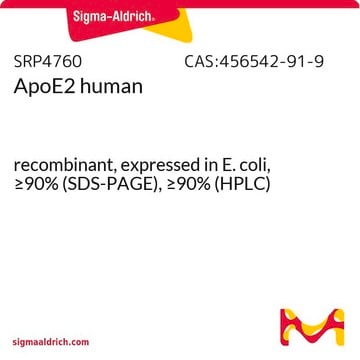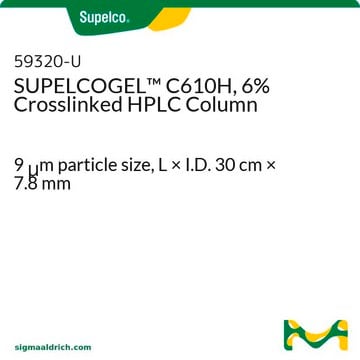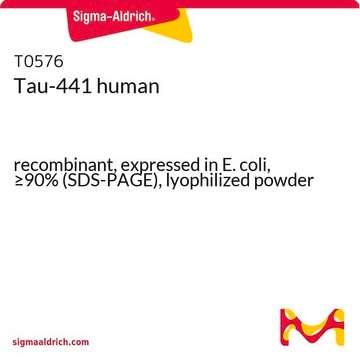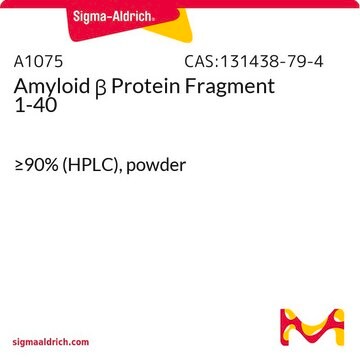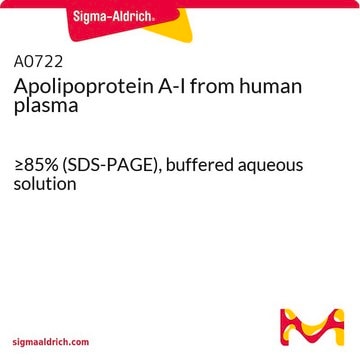A3234
Apolipoprotein E4 human
recombinant, expressed in E. coli, ≥90% (SDS-PAGE and HPLC), lyophilized powder
Sinónimos:
ApoE4
Iniciar sesiónpara Ver la Fijación de precios por contrato y de la organización
About This Item
Productos recomendados
recombinant
expressed in E. coli
Quality Level
assay
≥90% (SDS-PAGE and HPLC)
form
lyophilized powder
UniProt accession no.
storage temp.
−20°C
Gene Information
human ... APOE(348)
¿Está buscando productos similares? Visita Guía de comparación de productos
General description
Apolipoprotein E (ApoE) is present in the brain and is mainly produced by astrocytes. It is a 299 amino acid glycoprotein of 34kDa. It is present in all classes of lipoproteins except LDL (low-density lipoprotein). APOE gene has three alleles, such as APOE ε3, APOE ε4 and APOE ε2. It is located on human chromosome 19q13.
Biochem/physiol Actions
ApoE4 (apolipoprotein E4) is associated with AD (Alzheimer′s disease).
Apolipoprotein E4 is a member of the apolipoprotein E family of plasma lipoproteins that bind reversibly with lipoprotein and play an important role in lipid metabolism. ApoE4 regulates plasma lipid levels by increasing the degradation of particles rich in triglycerides and cholesterol. In addition to facilitating solubilization of lipids, these proteins help to maintain the structural integrity of lipoproteins, serve as ligands for lipoprotein receptors, regulate the activity of enzymes involved in lipid metabolism and bind amyloid-β protein, the major component of plaques in Alzheimer′s disease, which it delivers to the microglia, the major scavenger cells of brain. Individuals heterozygous for the ApoE4 allele are at higher risk of late-onset Alzheimer′s disease. ApoE exists in three major isoforms: E2, E3, and E4, which differ from one another by a single amino-acid substitution. Recombinant human ApoE4 is a 34.4 kDa protein containing 300 amino acid residues.
Physical form
Lyophillized from a 0.2 μm filtered solution in 20 mM sodium phosphate, pH 7.8.
Storage Class
11 - Combustible Solids
wgk_germany
WGK 3
flash_point_f
Not applicable
flash_point_c
Not applicable
Certificados de análisis (COA)
Busque Certificados de análisis (COA) introduciendo el número de lote del producto. Los números de lote se encuentran en la etiqueta del producto después de las palabras «Lot» o «Batch»
¿Ya tiene este producto?
Encuentre la documentación para los productos que ha comprado recientemente en la Biblioteca de documentos.
Los clientes también vieron
Roles of apolipoprotein E4 (ApoE4) in the pathogenesis of Alzheimer's disease: lessons from ApoE mouse models
Huang Y
Biochemical Society Transactions, 120(4), 702-736 (2011)
Traumatic Brain Injury
Neurobiology of Brain Disorders, 120(4), 219-235 (2015)
Twenty years of the Alzheimer?s disease amyloid hypothesis: a genetic perspective
Tanzi R E and Bertram L
Cell, 120(4), 545-555 (2005)
Lipids and disorders of lipoprotein metabolism
Clinical Biochemistry, 120(4), 702-736 (2014)
Fatemeh Nouri Emamzadeh et al.
Neuroscience letters, 618, 146-151 (2016-02-28)
Parkinson's disease is a progressive brain disorder due to the degeneration of dopaminergic neurons in the substantia nigra. The accumulation of aggregated forms of α-synuclein protein into Lewy bodies is one of the characteristic features of this disease although the
Nuestro equipo de científicos tiene experiencia en todas las áreas de investigación: Ciencias de la vida, Ciencia de los materiales, Síntesis química, Cromatografía, Analítica y muchas otras.
Póngase en contacto con el Servicio técnico
